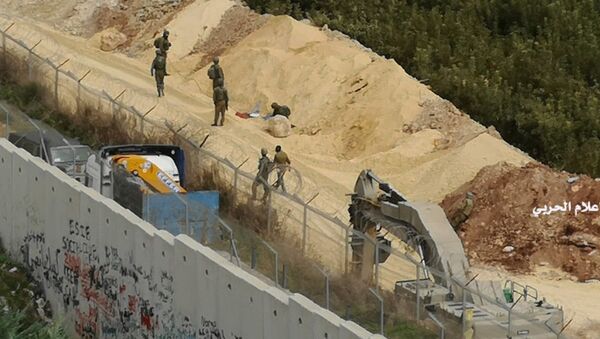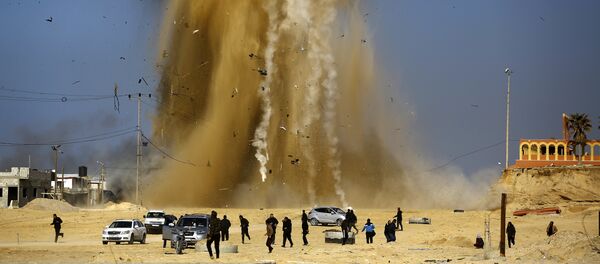Jonathan Conricus, the IDF spokesman, has said that there was currently "more than one" tunnel even though none of them jeopardized the security of the Israeli citizens as the tunnels currently were not being used.
Israel vowed that the operation would be conducted only on the Israeli-controlled territories, including the northern areas of the Golan Heights.
READ MORE: Six People Sentenced to Death For Collaboration With Israel — Gaza Court
Right after the announcement, the IDF has found and neutralized the first tunnel, made by the militant movement.
The Lebanese Armed Forces responded to the Israeli operation by saying that they were ready for any developments on the border with Israel and were making efforts together with the UN forces to maintain stability in the area. The United Nations Interim Force in Lebanon (UNIFIL) said that it had increased security patrols at the Lebanese-Israeli border to avoid potential escalation.
Late on Tuesday, Israeli Prime Minister Benjamin Netanyahu said that the country would demand convocation of an emergency meeting of the UN Security Council to condemn the actions of the Hezbollah.
Hezbollah's Reaction to Determine Scale of Israeli Operation
Israel is not interested in escalation at the border with Lebanon, however, it is the response of Hezbollah that will determine the scale of the operation as Israel is ready to expand it, the experts told Sputnik.
"We are determined to destroy all Hezbollah underground tunnel systems approaching the state of Israel, going into the state of Israel, violating the sovereignty of the state of Israel. Now, Hezbollah has to make the decision how to react. If that will be something which will begin escalation and deteriorate towards big operation – it might happen. So the IDF does not know what will be the reaction, it prepares for all the scenarios, including a big operation," Yaakov Amidror, a senior fellow at the Jerusalem Institute for Strategic Studies (JISS) and retired IDF general, told Sputnik.
READ MORE: Israel Kicks Off Op to Thwart Hezbollah Attack Tunnels on Lebanese Border — IDF
Moran Stern, an adjunct lecturer at the Program for Jewish Civilization in Georgetown University’s Edmund A. Walsh School of Foreign Service, has also told Sputnik that Israel was unlikely seeking an escalation of tensions at the border.
"Israel has no interest in escalating the situation on its border with Lebanon and the mutual Israel-Hezbollah deterrence, a relic to the 2006 Lebanon War, still works. But in situations of heightened tensions, miscalculations are possible and a rapid escalation [is] likely. Killing soldiers / Israeli personnel who work to destroy the tunnels or the killing of Hezbollah men have the potential to develop into something broader. But since the sides have little interest in war now and since the stakes for all sides are very high, I do not see it happening," Stern underlined.
As for the possible response of Hezbollah to the Israeli operation, Iran is expected to play a role in the decision-making process as the movement’s avid supporter, according to the retired IDF general.
"Hezbollah is not an independent organization, it is an arm of Iran, it is an extension of the Iranian capabilities … Hezbollah’s reaction, which no question will be decided jointly with the Iranians, if that is something that will lead to a big operation, Iran might be involved – directly or indirectly," Amidror said.
At the same time, the militant group does not appear to be interested in flaring up border conflict with Israel as well, according to the experts.
"Hezbollah has suffered a serious strategic and reputational blow when Israel discovered its tunnels. As long as the war in Syria has not ended, neither Hezbollah nor its patrons in Tehran has an interest in opening another front against Israel which might endanger their achievements in Syria. As long as Israel destroys the tunnels on its side of the border Hezbollah has no excuse to retaliate. An Israeli violation of Lebanese sovereignty might urge Hezbollah to retaliate. But considering that Israeli jets have been flying over Lebanon's skies multiple times in recent years and the organization refrained from responding, I do not see the destruction of the tunnels as a 'good enough' reason to open a war with Israel," Stern said.
Russia May Play Key Role in Alleviating Tensions
Moscow, which is actively involved in the settlement of the Syrian crisis, may act as a mediator in case the Israeli operation will result in hostilities, according to the scholar.
"Russia, too, is important here. Moscow has a clear interest in keeping the Assad regime in place and it will try to keep its Iranian partners from dragging Israel into war. Moscow is also key for it is the only actor which has open channels — and leverage- with all sides. Russia could play a key role in mitigating tensions," Stern said.
Moscow noted that the Israeli actions should not violate the UN Security Council Resolution 1701 defining the parties' rules of conduct in the Blue Line region, and expressed hope that UN contingent deployed in the region will prevent any breaches.
Views and opinions, expressed in the article are those of the speakers and do not necessarily reflect those of Sputnik.



